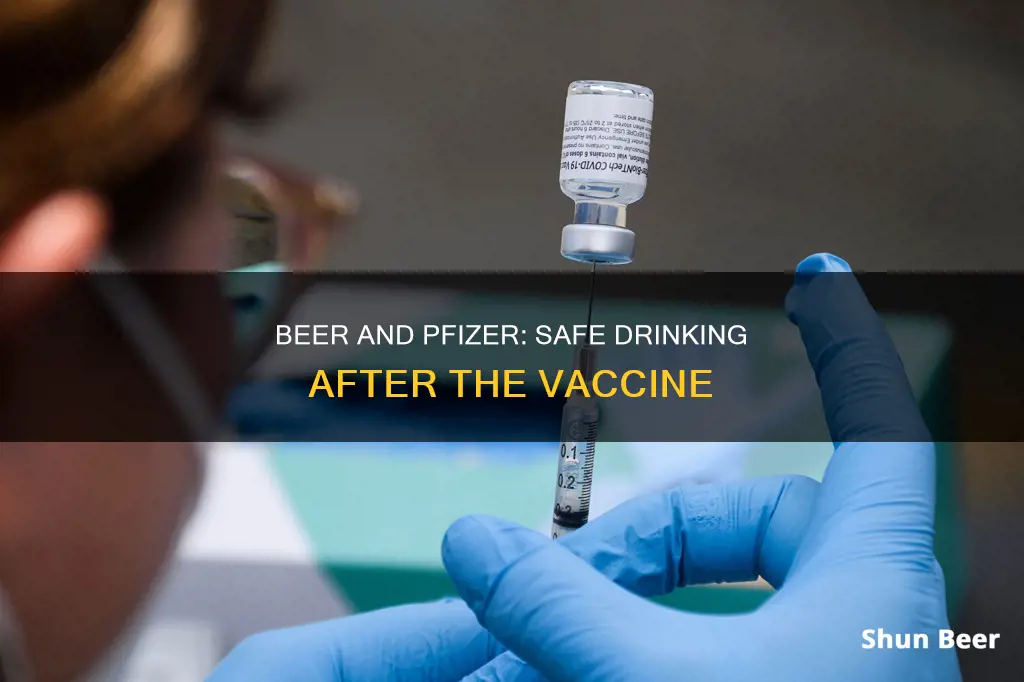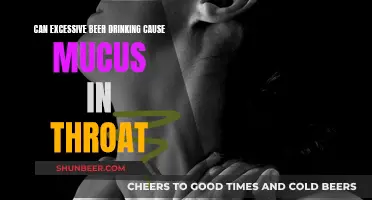
There is no evidence that consuming a moderate amount of alcohol will impact the effectiveness of the Pfizer vaccine. However, heavy drinking can suppress the immune system and potentially interfere with your vaccine response. Experts suggest that it is best to avoid increasing your alcohol intake in the days following your vaccine.
| Characteristics | Values |
|---|---|
| Can you drink alcohol after the Pfizer vaccine? | Yes, but only in moderation. |
| What is considered moderate drinking? | Two or fewer drinks per day for men and one drink or fewer per day for women. |
| What happens if you drink heavily after the Pfizer vaccine? | Heavy drinking can suppress the immune system and potentially interfere with your vaccine response. |
| Is there any research to support this? | Research has found that heavy drinkers had a weak response to the vaccine. |
| Are there any other recommendations regarding drinking after the Pfizer vaccine? | Drinkaware recommends not drinking any alcohol for at least two days before and at least two weeks after vaccination. |
What You'll Learn
- Drinking alcohol after the Pfizer vaccine is safe in moderation
- Heavy drinking can suppress the immune system and interfere with the vaccine's effectiveness
- Drinking alcohol before the Pfizer vaccine is not advised due to potential side effects
- Drinking water is recommended after the vaccine to stay hydrated
- There is no evidence that a drink or two will render the Pfizer vaccine ineffective

Drinking alcohol after the Pfizer vaccine is safe in moderation
According to the Centers for Disease Control and Prevention (CDC), the Dietary Guidelines for America define a moderate amount of alcohol as two or fewer drinks per day for men and one drink or less per day for women. It is recommended that no more than 14 units of alcohol be consumed each week by any adult, and that at least three days a week are drink-free.
While it is not necessary to abstain from alcohol completely after receiving the Pfizer vaccine, it is important to drink in moderation and be mindful of your overall health. Alcohol can make you more susceptible to other illnesses and increase the severity of COVID-19 vaccine side effects, such as fever, chills, and aches.
To ensure your immune system is functioning optimally and to reduce the risk of side effects, it is advisable to avoid increasing your alcohol intake or engaging in heavy drinking in the days following vaccination. This will give your body the best chance to build immunity and protect yourself from the virus.
In summary, drinking alcohol after the Pfizer vaccine is safe when consumed in moderation. However, excessive alcohol consumption can negatively impact your immune system and potentially interfere with the vaccine's effectiveness. It is important to follow guidelines, drink responsibly, and prioritize your health during the vaccination process.
Beer Consultation: A Guide to the Process
You may want to see also

Heavy drinking can suppress the immune system and interfere with the vaccine's effectiveness
While there is no conclusive evidence that alcohol reduces the effectiveness of the Pfizer vaccine, heavy drinking can suppress the immune system and interfere with the vaccine's effectiveness.
Drinking alcohol can weaken the immune system, leaving the body vulnerable to infections and diseases. Alcohol has a negative impact on both the innate and adaptive immune systems, impairing the body's ability to defend itself against infections. The innate immune system provides general immunity by responding to viruses, bacteria, and other microorganisms, while the adaptive immune system is responsible for immune memory, such as remembering previous infections.
Heavy drinking can have both short-term and long-term effects on the immune system. Consuming 5-6 drinks in a single session can suppress the immune system for up to 24 hours. Over time, drinking can lead to longer-term problems, as the immune system takes longer to recognize and respond to infections. This can result in more intense illnesses and prolonged symptoms. Additionally, heavy drinking can impact the immune cells that protect the lungs, increasing the risk of serious conditions such as pneumonia.
To maintain a strong immune system and ensure the optimal effectiveness of the Pfizer vaccine, it is advisable to refrain from heavy drinking, especially during the initial weeks after receiving the vaccination.
The Magic of Bottoms-Up Draft Beer: How Does It Work?
You may want to see also

Drinking alcohol before the Pfizer vaccine is not advised due to potential side effects
While there is no conclusive evidence that alcohol consumption directly impacts the body's immune response to the Pfizer vaccine, heavy drinking can weaken the immune system and exacerbate vaccine side effects. Therefore, drinking alcohol before the Pfizer vaccine is not advised due to potential side effects.
Chronic heavy drinking and binge drinking can reduce the immune system's effectiveness, making you more susceptible to respiratory illnesses such as ARDS, pneumonia, and sepsis. Alcohol consumption can also increase the risk of severe side effects from the vaccine, including fever, chills, aches, and nausea.
To optimize your immune response to the Pfizer vaccine, it is recommended to avoid heavy drinking or binge drinking before and after vaccination. Instead, focus on getting adequate sleep, nutrition, and hydration, which will support your body's recovery process.
While there are no official guidelines or recommendations regarding alcohol intake before the Pfizer vaccine, it is always best to consult with a healthcare professional for personalized advice.
Beer of the Month Club: How Does It Work?
You may want to see also

Drinking water is recommended after the vaccine to stay hydrated
Drinking alcohol after receiving the Pfizer vaccine is unlikely to be harmful. However, excessive alcohol consumption can weaken your immune system and make you more susceptible to infections, including COVID-19. Experts recommend drinking water after the vaccine to stay hydrated, which is essential for recovery and can help minimize post-vaccination complications.
Water is crucial for maintaining adequate hydration levels in the body. The recommended daily fluid intake for females is 2.7 liters, while for males, it is 3.7 liters. These amounts include fluids from food, which account for about 20% of our total fluid intake. To ensure adequate hydration, it is recommended to spread water intake evenly throughout the day. Aim for eight 8-ounce servings of water, or 16 ounces during each quarter of the day.
Drinking water before and after the Pfizer vaccine can be beneficial. Staying hydrated is essential, especially if you develop a fever, a common side effect of the vaccine. Water helps the body recover from the vaccine's effects and can reduce the risk of dehydration, which may worsen other side effects.
In addition to water, there are other ways to stay hydrated. Green tea is an excellent option, providing rehydration and a boost of antioxidants. Fruit and vegetable juices can also help you feel energized after the vaccine. While water alone may not combat all side effects, staying hydrated is still beneficial. However, be cautious not to over-hydrate, as it can cause health risks due to sodium level drops.
Along with hydration, eating a balanced diet of nutrient-rich foods can boost your immune response to the Pfizer vaccine. Focus on lean proteins, fruits, vegetables, and whole grains. These foods provide essential nutrients that support the immune system, helping your body build immunity after the vaccine.
Beer Science: Brewing Chemistry and History Podcast
You may want to see also

There is no evidence that a drink or two will render the Pfizer vaccine ineffective
There is no evidence that consuming a moderate amount of alcohol will impact the effectiveness of the Pfizer vaccine. According to the New York Times, there is no risk of having a drink or two around the time of your vaccine. However, it is important to note that heavy drinking or binge drinking can suppress the immune system and potentially interfere with your vaccine response.
The purpose of the Pfizer vaccine is to help your immune system recognize the virus that causes COVID-19 as a foreign invader. While the vaccine is designed to generate protective levels of antibodies against the coronavirus, anything that interferes with the immune response could be a cause for concern.
According to the Dietary Guidelines for Americans, moderate alcohol consumption is defined as two drinks or less per day for men and one drink or less per day for women. It is recommended that no more than 14 units of alcohol be consumed each week by any adult, and that at least three days a week are drink-free.
While there is no evidence that a drink or two will render the Pfizer vaccine ineffective, it is still important to drink in moderation. Heavy drinking can have negative effects on the body, including weakening the immune system and increasing the risk of severe COVID-19.
To ensure the best response to the vaccine, it is recommended to avoid drinking any alcohol for at least two days before and at least two weeks after vaccination. This allows the body to build its own immune response to the coronavirus infection and ensures the greatest benefit from the vaccine.
Boston Beer Works: Logan Airport Location Guide
You may want to see also
Frequently asked questions
Yes, but only in moderation. Heavy drinking can suppress the immune system and interfere with your vaccine response.
For men, drinking more than four drinks on a given day is considered excessive. For women, it's more than three drinks.
It's recommended that you don't drink any alcohol for at least two days before and at least two weeks after getting the vaccine. This will ensure your immune system is at its best to respond to the vaccine and protect you.
Side effects of the Pfizer vaccine include chills, fevers, fatigue, and vomiting. These side effects are more common after the second dose.
It's generally recommended to avoid taking painkillers before and after the vaccine. However, if you are experiencing severe side effects, you can take acetaminophen or ibuprofen a couple of days after the vaccine.







